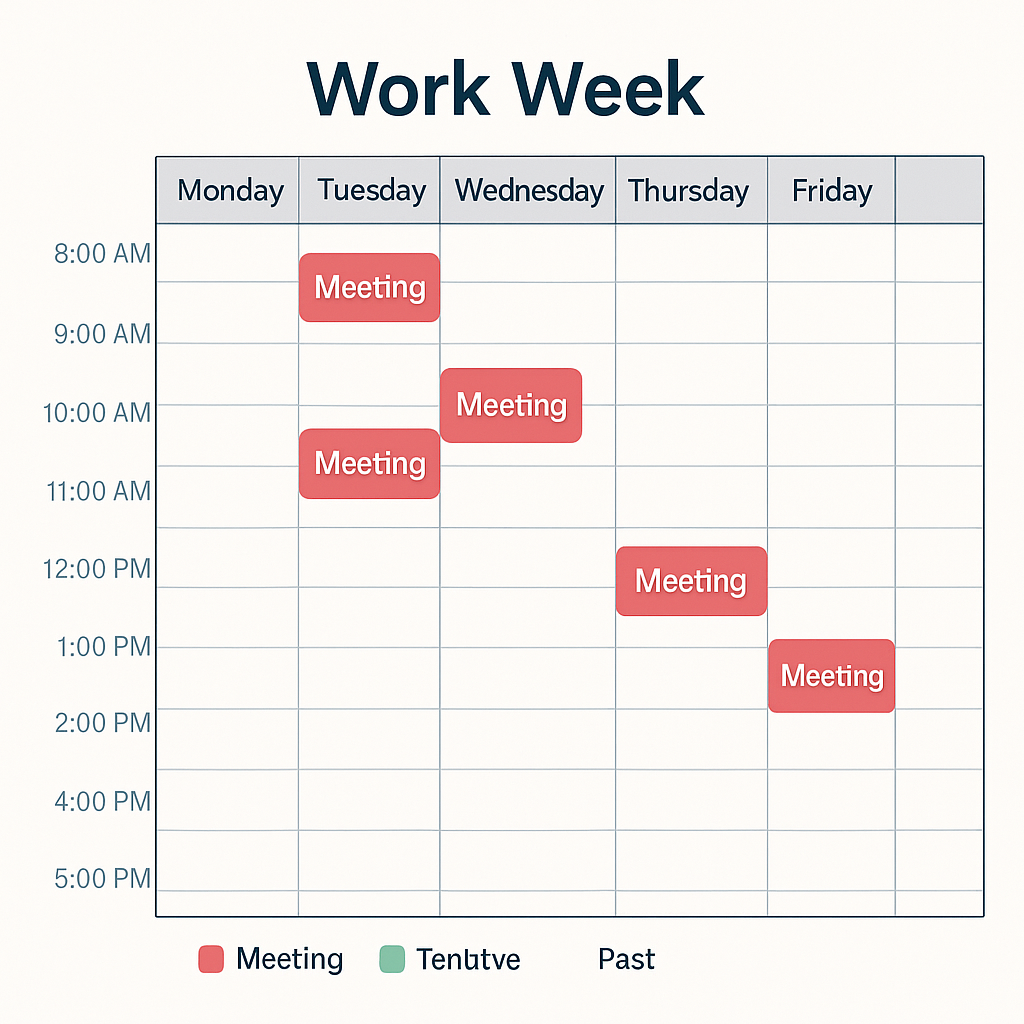Calendar Management 101
In today’s fast‑paced work environment, managing your calendar can either make or break your work week. Although meetings are not inherently bad, poorly managed calendars can make them feel like a waste of precious time. From overlapping invitations to back‑to‑back calls, a cluttered calendar causes fatigue and decreased productivity. Effective calendar management is a crucial part of meeting support that preserves deep work time, maximizes participation, avoids conflicts, and ensures goals are met. In this blog post, we will discuss practical strategies to manage your calendar with intention and purpose.
Set Clear Focus Time and Meeting Hours
Plainly define your meeting availability and block out time for deep work by labeling specific hours during the day when you are available or unavailable for meetings. This—
o Prevents burnout or meeting fatigue,
o Allows for concentrated work outside of meeting blocks, and
o Helps communicate availability clearly to your team.
💡 Tip: Use Outlook’s shared calendar settings to make your availability visible to colleagues.
Embrace Buffer Times
Build buffer times between meetings—even 10–15 minutes can make a difference! Take this time to recap notes and action items from the previous meeting, mentally reset and prepare for the next meeting, and avoid the stress of running late. Some scheduling tools, such as Google Calendar or Outlook, can automatically add these buffers to your calendar. This also means you may have to politely decline or ask to reschedule a call.
💬 Try this: “Thank you for the invitation! Is there any way we can move this to another date or time so I can give it my full attention?”
Audit Recurring Meetings
Recurring check‑ins or brainstorming sessions are useful but can sometimes become unnecessary noise. To sort out the important recurring meetings from the less helpful ones, you should ask yourself if the meeting—
o Serves a purpose.
o Can be shortened, merged, or cancelled.
o Could become an asynchronous update.
🛠️ Common tools for asynchronous updates include email, Teams/Slack, or any shared document.
Use Scheduling Tools for Convenience
Tools such as Microsoft Bookings or Google Appointment Schedules make it easier for others to book time with you based on your selected preferences, reducing email back‑and‑forth, offering only your preferred availability, and saves both parties time.
Color Code for Clarity
Visual organization helps you make scheduling decisions at a glance. You can use color codes to distinguish between meetings, focus time, breaks, and any general work times.
📅 A color‑coded calendar lets you instantly see how your week is shaping up.
Calendar management is more than just staying organized—it can truly impact your stress levels during the work week. When we manage our calendars with intention, we increase our own productivity and create space for more efficient and purposeful meetings. A well‑managed calendar is a powerful tool that provides better meeting support and healthier workdays!
Need help with meeting support?
PAI Consulting can help you take your meetings to the next level.
Contact us today for a consultation and let our meeting support experts help your meetings succeed.
Contact us for a consultationBack to Meeting Your Needs home.
Do you have questions or concerns about meetings? Share them with us!
PAI Consulting | Helping you succeed. Learn more.
Any opinions expressed in this article are those of the author and not the opinion of PAI Consulting. In addition, this article may contain links to third-party websites. PAI Consulting does not endorse or make any representations about them, or any information, software, or other products or materials found there, or any results that may be obtained from using them.
We welcome thoughtful and respectful discussion.
To keep this space safe and productive, please follow these guidelines:
Be respectful. Personal attacks, name-calling, and abusive language will not be tolerated.
Stay on topic. Keep comments relevant to the content of the post.
No spam or self-promotion. Links and promotions that are not relevant to the discussion will be removed.
Use appropriate language. This is a professional environment—please avoid profanity or offensive language.
Protect privacy. Don’t share personal information—yours or anyone else’s.
You may reply to, like, or flag other comments.
Comments are moderated and may be edited or removed at our discretion.
By commenting, you agree to abide by this policy.

